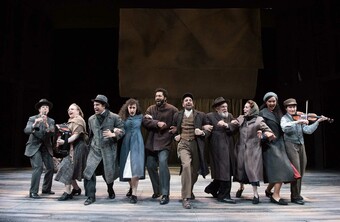Whether by indefatigable optimism or mere stubbornness, I wasn’t deterred by the years of dismissiveness. In fact, I recently finished my PhD in theatre and performance studies. In grad school, I was introduced to Jonas Barish’s The Antitheatrical Prejudice, one of the landmark texts in the field of theatre history. As a nearly forty-year-old piece of scholarship, there are certainly some ways in which the study is dated. Still, the book is a compelling and wide-ranging analysis of cultural opposition to theatrical endeavors.
One of the key facets of Barish’s argument is that, throughout history and across cultures, theatrical activity has almost always been met by vociferous opposition. From ancient Greece, when Plato wrote that acting and the theatre would be excluded from his ideal state, to the Soviet era in Russia, when strict governmental regulation dictated what type of work theatre artists were permitted to create, theatre has been subject to both philosophical criticism and material censorship.
What’s Past Is Prologue (Except When It Isn’t)
It’s easy to think of antitheaticalism as a thing of the past. The twentieth century in Europe and North America is often depicted, from a theatre-historical perspective, as a time of radical experimentation and boundary pushing. And there are certainly myriad examples of artists mounting challenges to censorship, from the late nineteenth century to the present. The mordant dramas of realists like Ibsen confronted social hypocrisy. The socialist-minded theatre of Brecht sought to illuminate the inequitable conditions of capitalism. In the sixties and seventies, avant-garde companies like the San Francisco Mime Troupe, Bread and Puppet Theatre, the Living Theatre, and the Monstrous Regiment Theatre Company experimented with theatrical form while simultaneously advocating for political, social, and economic causes. In one of the theatre history classes I took as an undergrad, I remember thinking of the Licensing Act of 1737, a law that empowered the Lord Chamberlain’s office to censor theatre productions in the United Kingdom, as the villain that stalked theatre’s development throughout history, hampering creativity. The law’s eventual demise, after the Theatres Act 1968 ended theatrical censorship in the UK, seemed like a triumph for experimentation and the freedom of the stage.
Antitheatrical voices have, according to Barish, almost always stressed that the theatre is a uniquely aberrant art form and therefore more susceptible to corruption than, say, painting.
Of course, viewing theatre history as a linear narrative progressing towards modernity is overly simplistic in any number of ways. Still, a young theatre artist today might be tempted to think of themselves as privy to a liberty in their art. And to some extent that’s true: a play can engage with controversial political, sexual, or religious themes and evade governmental regulation. That’s not to say private, non-state groups won’t take issue with a piece of theatre. Again, numerous examples make this point: the furor over Terrence McNally’s Corpus Christi in the late nineties, the attention-seeking protests of productions of The Laramie Project by the Westboro Baptist Church, the recent objections by the right-wing to the Public’s 2017 production of Julius Caesar that resulted in corporate sponsors withdrawing funding.
Still, this type of pressure is distinct from active governmental censorship. Further, these objections aren’t to theatricality itself but to the subject matter of the plays in question. Barish’s work maps out an objection to the very existence of theatre and acting. Antitheatrical ideology doesn’t merely concern itself with how plays might mock and potentially undermine cultural values, although that criticism is part of its critique. Rather, the core belief of antitheatricalism is that the theatre is somehow an unnatural act. Antitheatrical voices have, according to Barish, almost always stressed that the theatre is a uniquely aberrant art form and therefore more susceptible to corruption than, say, painting.
Market Economics and the Antitheatrical Prejudice
Today, while plays with edgy content might elicit pushback from offended groups, theatre is largely accepted as a perfectly innocuous form of art. Or is it? While few people would take issue with their children participating in a school play, how many would be excited to hear their child wanted to study theatre in college or pursue a career in it? That’s not to say that all parents would exhibit universal derision at a potential theatre major. I also don’t think a parent’s concerns about their children’s ability to obtain gainful employment are totally unfounded. My point here is that the relatively low reputation of the study and pursuit of theatre is the primary way in which antitheatricalism most clearly manifests itself today.
A quick Google search will turn up no shortage of articles sounding dire warnings that a theatre major will lead to a life of unemployment and, if the artist eventually finds work, low wages. Theatre departments are also safe targets for university administrators and politicians to attack. When I was in graduate school at the University of Georgia, a legislator commented that society doesn’t need more theatre majors; he clearly felt safe in questioning the value of a theatre degree, especially at a publicly funded school. Private schools aren’t immune to this kind of thinking, either: in some recent restructuring, the University of Tulsa shut down its theatre program, and Bradley University proposed a similar cut for budgetary reasons, although that effort seems to have stalled.
Theatre, as a skills-based major, is actually far more pragmatic than it’s given credit for.
Of Skills and Bills
The line of thinking that leads to modern antitheatricalism is based on some flawed assumptions. For one, we would have to accept that the ultimate purpose of a college education is job training, preparing students narrowly for a career. More broadly, antitheatrical thinking is shaped by the neoliberal logic that dominates so much of society, in which all human endeavors are evaluated predominantly by their ability to lead to economic gain. Basically, anything that doesn’t pay well isn’t worth doing.
I reject the idea that college’s primary goal is job training, based both on its historical origins and the structure of a college education, which almost always features some amount of general education. I also dismiss the idea that education is only worthwhile if it leads to economic gain. Still, I’m not going to lay out a gauzy, soft-focus suggestion that the study of theatre ennobles one’s life so much that it’s worth ignoring the economic realities of graduating with a theatre degree. As someone with three degrees in the field and the student loans to prove it, I am well aware that there are economic consequences associated with making these decisions. Instead, my point here is that theatre, as a skills-based major, is actually far more pragmatic than it’s given credit for.
The fact of the matter is that post-millennial America is not an information-poor society. For good or ill, most people have a device in their pocket at all times that grants them instant access to the sum total of human knowledge. In this environment, employers are beginning to value skills more than knowledge in job candidates. Many employers already see a liberal arts degree as a valuable asset. The theatre degree, then, should be even more attractive to employers than many of its peers.
Rather than allowing opponents of the theatre major to define it as wasteful or impractical, theatre departments and professionals need to rebrand it as a skill-intensive course of study. For example, through my coursework as a theatre major, I gained a number of skills, including carpentry, painting, sewing, color theory, fashion and interior design, budgeting, project management, marketing and promotion, public speaking, research and writing, contract negotiation, sound engineering, applied math, and some light electrical engineering. Theatre also imparts a host of soft skills like networking, collaboration, conflict resolution, leadership, analytical thinking, problem solving, and time management. Depending on a student’s particular focus, they may pick up even more abilities beyond these listed. Some of these skills you would get from completing any college-level course of study. Most you would not.
Clearly, a theatre major is hardly a glorified exercise in “playing pretend,” as it is often derided. The study of theatre offers students practical, real-world skills, and its elimination from college curriculums would be lamentable. Of course, one might argue, “Well, so what? Who cares if there are fewer theatre majors and programs around the country? It might even result in less competition for theatrical jobs.” I would argue that the stakes of declining enrollment in theatre programs are actually quite high. First of all, if members of the profession care about diversity and inclusion in the theatre, its study must be attractive to as many people as possible. If the theatre major is derided as a mere frivolity, it will attract a smaller pool of prospective students. At a time when we should be prioritizing making theatre training accessible to a broader group of people from a range of backgrounds, this subtle antitheatrical sentiment will undermine that goal. Further, a great way to improve the cultural standing of theatre more generally would be growing the number of theatre majors. More theatre students means not only more artists but more future audience members as well.
By emphasizing the concrete skills one learns as theatre major, departments can win students who are interested in the subject but might be afraid that studying theatre is frivolous or impractical.
In his study, Barish makes the point that theatre and antitheatricalism are deeply entwined. The antitheatrical prejudice emanates from a perverse fascination with the theatre. After all, a society wouldn’t seek to censor, regulate, or ban an art form that wasn’t regarded as uniquely powerful and seductive. I suspect that modern antitheatricalism stems from the fact that theatre is fun. Putting a show together as part of a team is thrilling and endlessly rewarding. That’s why people are willing to do it as a hobby. The economic bias against theatre is part of a broader cultural belief, growing out of the country’s Puritanical roots, that work isn’t supposed to be fun. But that’s precisely the appeal of a theatrical education. What if you could learn all the same skills as a business major but in a much more hands-on, experiential way? Wouldn’t that be more appealing to some students than sitting in a lecture hall? By emphasizing the concrete skills one learns as theatre major, departments can win students who are interested in the subject but might be afraid that studying theatre is frivolous or impractical.
Stemming the Antitheatrical Tide
We’re entering what could be a grim period of human history. America is at the beginning of the third major economic crisis of my lifetime. The beginning of the millennium saw the dot-com bubble burst, and less than a decade later the financial meltdown introduced even more precarity into people’s lives. The COVID-19 pandemic is likely to result in declining university enrollments and budgets even at well-funded schools, leading to a mad scramble for students. The upshot, though, is that this is an opportunity to change things from the way they’ve always been.
Theatre has often flourished amidst periods of extreme regulation. Artists from Shakespeare to Stanislavski to John Kani and Winston Ntshona have found ways to produce great art under repressive strictures. To be able to thrive amidst an adversarial environment, though, theatre teachers and practitioners have to understand the ways in which antitheatricalism operates. The best counter to an argument based in market economics is one that disproves the point on the same grounds. The logic of the neoliberal university seeks to make the theatre major a symbol of decadence and frivolity. By accomplishing that, theatre doesn’t need to be subjected to censorship. It doesn’t matter what plays are saying if nobody wants to go.
Theatre departments must foreground the concrete, marketable skills that students get out of studying the art form and highlight the wide range of professions it can prepare them to enter. College is a huge investment; students—and in many cases their parents—want to know they’re going to see a return on the money they spend. Complicating this problem is the fact that the overriding condition of the modern, global economy is precarity. Students are graduating into an unstable economy; they’re likely to have to change careers multiple times in their professional lives. Who, theatre departments should ask, is better suited to these conditions than theatre students? A theatre major might be tasked with drawing technical diagrams, running a production as a stage manager, building a staircase, and standing onstage in front of hundreds of onlookers all within the span of a single week. That is an admirable range of skills to have.










Comments
The article is just the start of the conversation—we want to know what you think about this subject, too! HowlRound is a space for knowledge-sharing, and we welcome spirited, thoughtful, and on-topic dialogue. Find our full comments policy here
Outstanding essay! Makes me wish my parents, friends, and -- most of all -- I had read one like this back when I was in high school!
Instead I did what was expected for one who got good grades in math and science. Which is why in recent years I've been concerned that all of this emphasis on encouraging young women to go into STEM (few consider STEAM) is going to cause a lot of women to be miserable, spending their lives doing what they are told rather than following their hearts.
In fact, a few years ago I found out about a young woman who, despite her great grades in math and science, was standing up to all the STEM pressure and was pursuing a degree in musical theater! It literally brought tears of happiness (for her) to my eyes.
In fact, it was one of the things that inspired me to write my play "Render Unto Drone" (available on the New Play Exchange), which (plot aside) is fundamentally about a young women who, when she appears to about to be killed (like several other kidnapped software engineers along with her already have been) -- by the very drones she worked on the software for no less! -- vows that if she survives she will forgo the big money and approval that she got by going into software and instead pursue her true artistic interests that have always been her true passion.